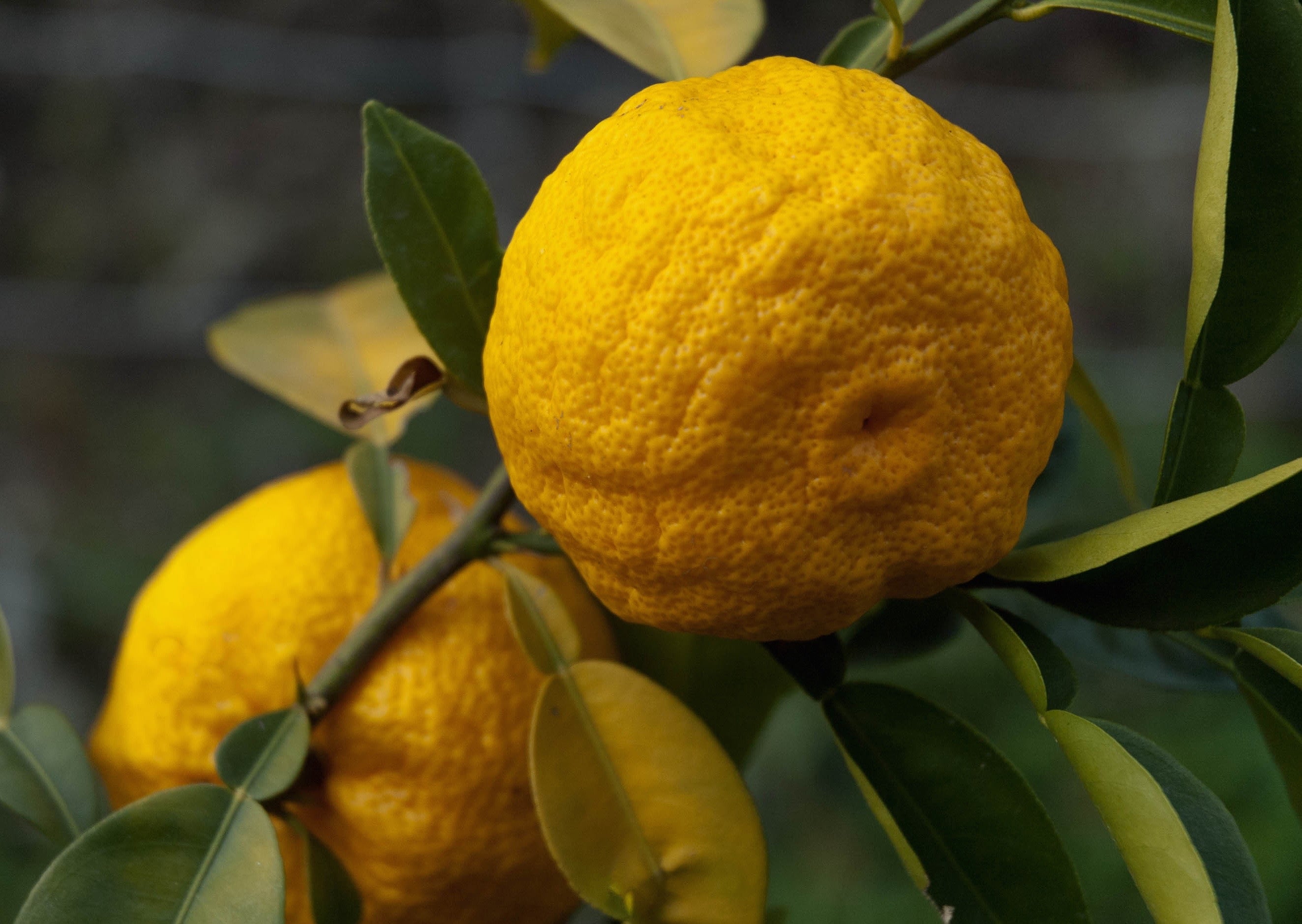How to Indulge in This Luxurious, Skin-Soothing Tradition
Read Time: 2-3 Minutes

With winter fast approaching, now is the perfect time take stock of the past season, prepare for the year ahead, and indulge in some serious self-care. In Japan, many mark this changing of the seasons with a traditional yuzu bath—a hot bath filled with the citrusy yuzu fruit.
We can think of no better way to prepare for the cold days ahead than with a relaxing, aromatherapeutic bath, so in this post we’ll be exploring the fascinating history and benefits of the yuzu bath while giving you some pointers on how to enjoy your own.
So what exactly is yuzu?
Yuzu, a citrus plant and fruit found in East Asia, is believed to be a hybrid of a sour mandarin and an Ichang papeda. Growing on small thorny trees, yuzu, which are green before ripening to a yellow hue, resemble small grapefruits and are extremely aromatic. The fruit originated in central China and Tibet, and was eventually introduced to Japan and Korea, where most crops are grown today. They were introduced to the U.S. in the late 1800s. Yuzu has a unique, complex flavor, but is often described as tasting like a cross between grapefruit, lemon, and mandarin.
But, why should I use it in a bath?
Yuzu produces a fresh, citrusy aroma that relaxes the body and mind, easing aches, relieving stress, and soothing sore muscles. In fact, nomilin—a substance found in the oil derived from yuzu rinds—promotes better circulation. Bathing with this vitamin C-rich fruit (it contains 3 times as much as a lemon!) is also said to ward off colds and viruses. After a yuzu bath, skin is left silky and soft. These citrusy dips are even said to bring good fortune for the year ahead and ward off evil.
How do the Japanese traditionally take yuzu baths?
In Japan, yuzu baths are traditionally taken on the day of the winter solstice, or Tōji, in public hot baths or hot springs. Sometimes encased in a cloth bag, whole fruits float in the water, releasing a bright aroma. Yuzu may also be cut in half to allow the juices into the water.
MŪN’s founder Munemi Imai has fond childhood memories of taking yuzu baths in Japan. “My parents had a yuzu tree in the backyard. Every year we would pick the fruit and cut it in half for our baths, which we took in a traditional Hinoki wood tub. The fragrance was heavenly, and I was always amazed at how soft and silky my skin would be afterward.”
Although yuzu is gaining popularity in the U.S., it’s still very difficult to find in most areas, so yuzu essential oil can be used as a substitute. For a relaxing, rejuvenating bath, combine a few drops of yuzu essential oil with 1/4 cup of Epsom salts and add to a warm bath.
I can eat the fruit too, right?
This aromatic fruit isn’t just for baths; it’s also delicious on its own as a snack or used as an ingredient in meals. Commonly used in Japanese, Chinese, and Korean food, yuzu lends a unique, refreshing flavor to a variety of dishes, from entrees to desserts. It’s also used in tea, cocktails, and juices. Until recently, yuzu was most commonly known to Americans as a component of ponzu, a tangy soy sauce-based sauce used in Japanese cooking. But the fruit is quickly gaining more recognition in the U.S., as well-known chefs experiment with this versatile ingredient.
What makes yuzu so healthy?
Yuzu is packed with powerful properties. Some of yuzu’s most notable benefits include:
- Antioxidant properties — Yuzu contains a whopping 100 g/150 mg of the powerful antioxidant vitamin C, boosting the immune system and maintaining the health of connective tissue, bones, and skin. Flavonoids (or phytonutrients—chemicals found in plants), also very powerful antioxidants, regulate blood sugar and blood pressure and improve brain function.
- Anticancer properties — The aromatic components of yuzu—including the organic compound limonene, which is produced by a variety of plants—not only possess antioxidant and anti-inflammatory properties, they also have anticancer properties.
- Microbial qualities — Found in yuzu seed, P-methoxycinnamic acid acts as a natural antibacterial agent, helping to protect against E. coli, Salmonella, and bacteria that causes food poisoning.
- Cardiovascular and circulation improvement — Many people report a warming sensation after ingesting the fruit; this is due to increased circulation. By improving blood flow, limonene and other terpenes (organic plant-based compounds) in yuzu prevent blood clots and therefore reduce the risk of cardiovascular disease.
- Aromatherapeutic effects — Yuzu’s bright, citrusy fragrance, which comes from its essential oils, promotes relaxation and eases stress. No wonder these essential oils are often used to make fragrances.
With colder weather upon us, it’s important to keep our immune system up and take some extra time for self-care and relaxation. Make sure to sign up for our newsletter (bottom right) to receive our health, wellness, and skin care tips directly to your inbox!








